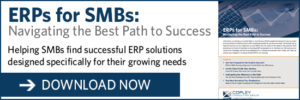Not too long ago, only large organizations could afford to invest in enterprise resource planning systems (ERP’s), but that has all changed. Thanks to continued innovations and improvements in technology, small to medium-sized businesses (SMBs) now reap the benefits of implementing similar versions of these highly effective ERPs, especially cloud-based ones. But navigating the SMB Cloud ERP market can be tricky. Although all SMBs operate in different ways, most have three basic needs from a modern ERP: efficiency, scalability, and a rapid implementation process1.
Efficiency:
One of the biggest enemies of a rapidly growing SMB is time, specifically the lack of it. Cloud-based ERPs can help companies gain back valuable time lost by keeping employees from replicating data across systems and often from having to enter it manually. More-so than older on-premises solutions, modern cloud ERPs better utilize machine learning and Artificial Intelligence to enhance every employee’s ability to perform tasks and analyses at a much faster rate, freeing up time to pursue new goals and opportunities. No wonder that 65% of SMBs expect that adopting a cloud ERP system will greatly boost the efficiency of their overall operations2.
Scalability:
At the rate SMBs can grow, their subject matter experts (SMEs) can rarely assess what their business will look like in a year, much less three years. SMBs can grow quickly, expanding into new customer territories, adopting new revenue streams and business models, and increasing sales volumes1. If their technology cannot grow and evolve at the same rate, then it will hold them back. Cloud-based ERP systems with constant updates and regular releases of new features ensures that the technology can handle growth and change to support SMB requirements, with no disruption to the existing service and more importantly, the business3.
Rapid Implementation:
One of the biggest reasons many SMBs hesitate to commit to implementing an ERP is their fear of the time required during the implementation phase. It’s a well-based fear; a long implementation can distract staff, delay growth and can cost a lot of money which is why a quick implementation is crucial to the company’s survival. Luckily, modern cloud-based ERP systems with industry best practices built in along with rapid implementation models can be deployed within weeks or months and not years when implemented correctly. With time to value greatly increased, SMBs will reap the benefits of a cloud-deployed ERP more quickly than they will an on-premises solution.
Overall, when SMBs commit to implementing a cloud-based ERP, they can expect faster results. Accounting will simplify financial reports and better manage resource allocation. Inventory management will accurately track product supply to ensure optimal stock levels. Manufacturing will improve forecasting and operations, helping the company to better allocate its budget. And analysis and reporting will provide comprehensive data to “ensure better decision making.4
So, what evaluation criteria or questions should a SMB use when selecting their Cloud ERP system4?
1. Ease of use: Can I easily navigate complex ERP features?
2. Inclusivity: Will employees across all departments and disciplines be able to use the ERP system features to enhance their productivity anywhere and at any time?
3. Integration: Will the new system contain built-in features that easily integrate with other software suites?
4. Value: Will the benefits of the ERP system outweigh the cost?
5. Risk Mitigation: Will the new system incorporate security features that greatly reduce fraud and cyber security threats?
Cloud-based ERPs, more so than on-premises ones, can meet all three needs and all five criteria, especially value. A cloud-based software subscription, considered an operating expense, helps free up capital while giving a company the flexibility to meet evolving operational needs. With this switch in expense models, companies will have access to funds for expansion and new business initiatives, and they will respond to growth market opportunities more quickly.4
Cloud ERP systems can have a pivotal role in any size business. Just because a business has not yet achieved Titan status does not mean it can’t operate like one.
1. What do small businesses need from ERP software?
2. Panorama Consulting Group 2020 ERP Report
3. Cloud ERP Scalability: Manufacturer Expands Production by 60%
4. 10 Best ERP Systems For Small Businesses On A Budget
5. Why Move to the Cloud
Learn More
E-Book – ERPs for SMBs: Navigating the Best Path to Success
In this eBook, we will help your Small to Medium-Sized Business (SMB) navigate the best path to find a successful Enterprise Resource Planning System (ERP) designed specifically for your growing needs. And the best way to begin the journey is to run a diagnostic on your SMB to see if it’s ready for the update or the purchase.

